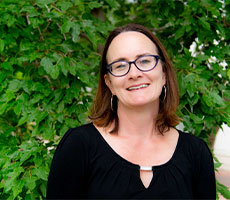Our Research Ace In The Hole
Five Questions For Jennifer Carroll
Robert | Family Medicine Oct 22, 2019
The University of Colorado Department of Family Medicine is fortunate to have many highly respected researchers on faculty. Dedicated health professionals working each and every day to advance the practice of family medicine and primary care to benefit the health of all. Jennifer Carroll, MD, is a prime example.
Tucked away in her window office on the third floor of Administration Office Building 1, Carroll is busy pushing the boundaries of research. When you pass by her door, you may notice that she is most often deeply engaged in a conference call. That’s because of her role not only as a faculty member here in Family Medicine, but also as director of the American Academy of Family Physicians National Research Network.
Briefly tell us about the National Research Network (NRN). What is it? What’s the focus? And, how did you become involved?
The American Academy of Family Physicians (AAFP) National Research Network (NRN) is a national practice-based research network with over 2300 members in all 50 states. The NRN conducts a wide variety of studies in primary care and family medicine. I’m attaching a recent presentation I gave of the NRN’s Research Portfolio at our recent Advisory Group meeting.
I became involved with the NRN in 2005 when I became director. I had been involved in numerous other local and regional practice-based research studies in family medicine in New York before I joined as NRN Director.
You have mentioned that of the more than 130-thousand AAFP physician members, that only a fraction are involved with research aimed at improving and innovating care. What do you think is behind those low engagement numbers and how can you possibly make a dent?
This is a big topic to answer briefly, but there are likely multiple causes including:
- physician burnout,
- changing administrative structures affecting physicians’ ability to engage in research, and
- lack of sufficient time and reimbursement to participate in research.
We try to make a dent by:
- pursuing topics or questions that have the highest relevance to family medicine,
- being realistic and respectful of the implication of physician/staff/practice participation on clinical workflows, and
- Offering appropriate reimbursement for time and effort. We are also working on a multi-pronged marketing strategy to boost excitement, awareness and engagement with the NRN.
What are the hot-button issues in Family and Primary care research at this point?
The opioid epidemic is a big one. Effective management of chronic pain is another.
Any one project right now that has particularly caught your attention that you’d like to talk about?
There is one called the PREPARE study, which is currently recruiting 1200 African American and Hispanic Latino adults with asthma to test the effect of a new approach to treating asthma, on a variety of asthma outcomes.
You mentioned that health disparities and the social determinants of health are passion issues of yours. How are you working to spark more research in those areas?
I am attempting to grow our portfolio of research in this realm both at NRN and the department of Family Medicine (and in many cases, collaboratively between the two), either by working on projects as principal investigator (PI), or fostering collaborations with other PIs/teams.
Currently, about half of our portfolio of projects at NRN addresses some aspect of a health disparity and/or social determinants of health. I am also keen to mentor junior faculty in our department in these broad topic areas, as we advance our department’s mission and commitment to tackling these issues.